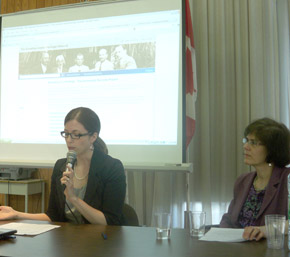Tens of thousands of community records now online
This article by Janice Arnold appeared in the June 23 edition
of the Canadian Jewish News
 MONTREAL - More than 25,000 database
records of the Canadian Jewish community dating back to the 18th
century are now available online in a readily searched
format.
MONTREAL - More than 25,000 database
records of the Canadian Jewish community dating back to the 18th
century are now available online in a readily searched
format.
Photo courtesy of CJN: Shannon Hodge,
left, demonstrates how to use the new Canadian Jewish Heritage
Network website, as Janice Rosen looks
on.
The new website Canadian Jewish Heritage Network
(www.cjhn.ca) catalogues and blends the vast repositories of the
Canadian Jewish Congress Charities Committee National Archives
(CJC) and the Jewish Public Library Archives (JPL). The plan is
that it will eventually become the virtual repository for the
archives and collections of Jewish communities and groups across
the country.
In addition, the site hosts more than 2,000 digitized
photographs and documents, as well as more than 50,000 genealogical
records and 5,000 associated images. There are also sound
recordings and moving images.
All of this is growing, almost weekly. And it's
bilingual.
This ambitious undertaking was led by Janice Rosen and
Shannon Hodge, archivists, respectively, of CJC and the JPL, who
overcame the traditional rivalry between the two institutions to
create a resource that enables the history of Canadian Jewry to be
told for generations to come.
The project was funded by the Samuel and Saidye Bronfman
Family Foundation (SSBFF).
The site is divided into four main sections: Explore,
Experience, Enrich and Educate.
Explore is the entry point for searches by key words, with
detailed tips on refining the quest; Experience is for browsing the
digital content, much of it set up in slide-show galleries; Enrich
offers information on how to donate archival material to the CJHN
partners; and Educate outlines free teaching aids developed by CJHN
for schools and organizations. They are designed to encourage
youngsters to learn about their community's past by using the
archives.
The online material is not only searchable, it can be
e-mailed, shared on social media, and printed. Many multi-page
documents are available in pdf format. Orders for physical copies
can be made directly from the web (for a fee, soon by
PayPal.)
A mobile application is in the works, too, for those who want
to check the archives while on the go.
The material, which largely comes from Montreal and Quebec,
encompasses organizations' annual reports, minutes, speeches, and
anniversary publications, and what archivists like to call
ephemera, such as family correspondence or event
programs.
The two institutions have also been entrusted over the
decades with the papers of writers, politicians, community
builders, teachers, activists and philanthropists.
The genealogical portal is sponsored by Penny Rubinoff of
Toronto and the Jewish Genealogical Society of Montreal. Among its
resources are Jewish Immigrant Aid Services' client lists; Jewish
Colonization Association (JCA) farm settler reports; translated
Yiddish obituaries from the Keneder Adler newspaper; and the Hebrew
Sick Benefit Association of Montreal's membership book
listings.
In addition, there is all of CJC's information about Jewish
servicemen casualties in the Canadian armed forces during World
Wars I and II.
Some entries in the family history section list contain such
information as the individual's profession, street address, country
of origin, and cause of death, which Rosen and Hodge think will be
of interest to historians and sociologists, as well as their
descendants.
Rubinoff, a Jewish family history buff, said at the site's
launch June 6, that she came across a 1911 JCA report about a young
Jewish couple homesteading in Edenbridge, Sask. She learned their
ages, that they came from Russia, and what crops and livestock they
raised on 60 acres.
"I felt like crying and I'm not even related to them," she
said.
The actual archives of both partners continue to exist in
their current locations: the JPL's at the Jewish Community Campus,
and CJC's downtown in Samuel Bronfman House, owned by Concordia
University.
Acquisitions from now on will be co-operative, Rosen said,
although they have tended to complement one another
anyway.
They are also developing more educational materials, virtual
exhibits, and plan greater outreach to encourage organizations to
entrust the preservation of their historic materials to
professional custody.
The advice of Hodge is to "play with the site." It is
user-friendly, but not what she would call easy. The archivists are
eager to assist users, and welcome questions and comments, as the
site is "organic," changing constantly.
CJC archives chair Norma Joseph said at the launch that the
enormous content makes clear that the history of Canadian Jewry is
distinct from its American neighbours, and that the community is
diverse.
Stephen Bronfman, an SSBFF board member, added that the site
brings the story of the community to non-Jews as well. "It's
important to get this knowledge out there."
Marc Gold, the new president of United Israel Appeal
Federations Canada, was credited by Joseph with keeping the
archives in Montreal. The Toronto federation made an offer to
consolidate all archives there after CJC no longer had the budget,
but many in Montreal resisted.
Gold said the Montreal federation should be thanked because
it has now assumed the archives' funding, through a permanent
endowment of the Alex and Ruth Dworkin Foundation.
"When you have to provide for the most vulnerable, for
education, when you have to make cuts, it takes vision to say the
archives are important," Gold said.
"But if we are the people of memory, then this is a tangible
expression of what we have to offer to our children and to the
world."
Back to
cjccc.ca In the News